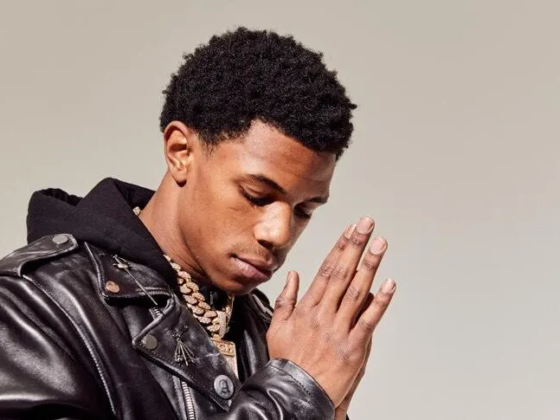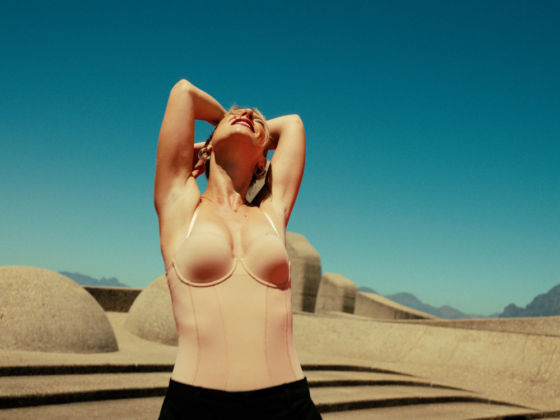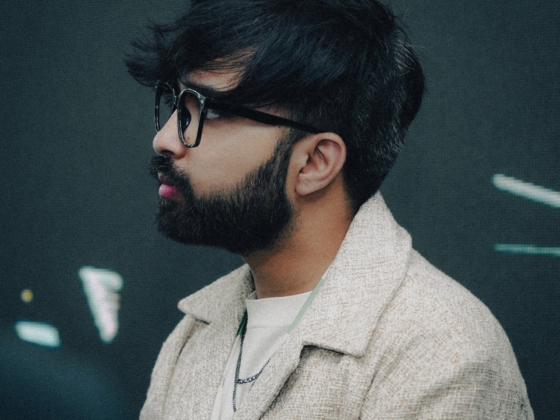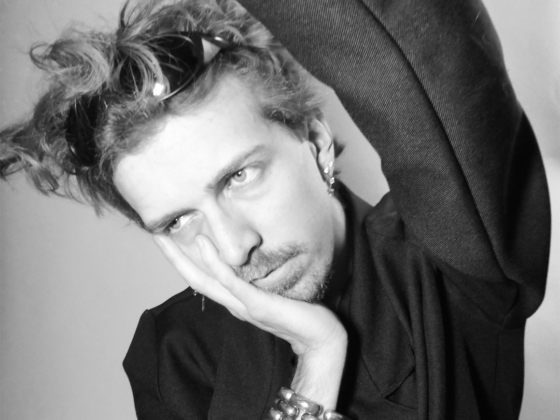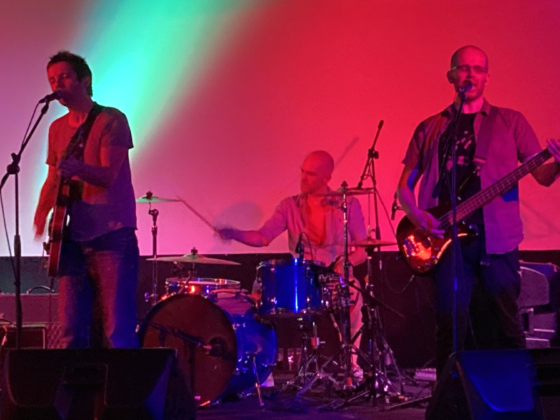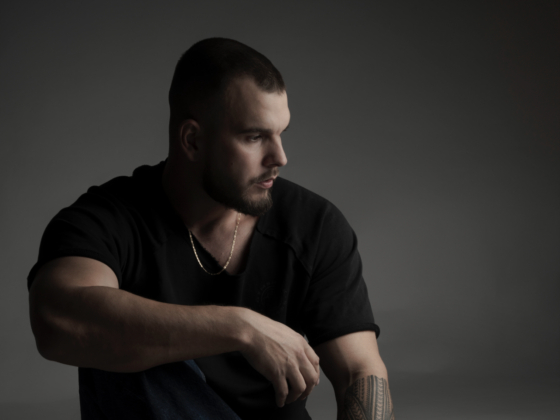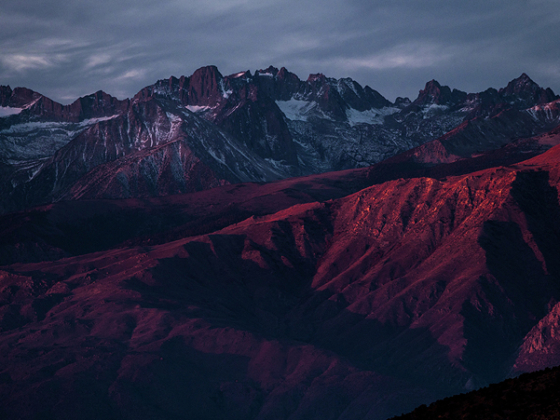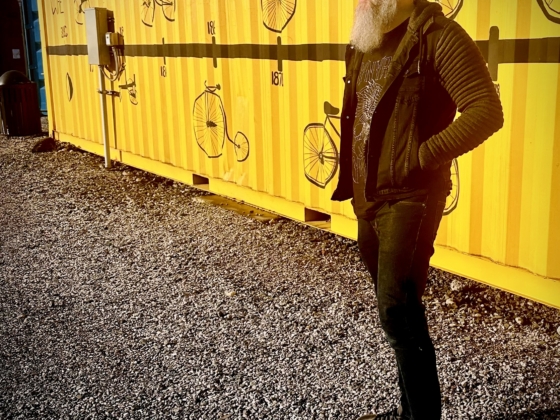Caribou has reached new heights with latest album Our Love, which puts minimal, emotionally charged lyrics on top of lush sonic soundscapes that call to mind modern dance music. The album came after the well-received, uptempo Swim and a four year hiatus, in which Dan Snaith dove head-on into today's dance scene as Daphni, performing DJ sets at clubs around the world. The jump to DJing and making pure dance music as Daphni didn't come as a surprise to Snaith's fans, who have seen Caribou move from minimal electronic music, to psychedelic rock to pop to deep house.
Snaith's jump back to Caribou after performing and releasing a record as Daphni brought more dance sensibilities to his music. The shift shows in Caribou's live sets, which are full to the brim with deep beats, extended songs, tremendous energy and frenetic lights. We talked to an amicable and soft-spoken Snaith before he went on a the Black Cat in Washington, D.C. Topics ranged from collaborations on Our Love, to transitioning between Caribou and Daphni, to Snaith being a "musical omnivore," to fatherhood's impact on Snaith's sound.
Earmilk: It’s been a little over a month since Our Love came out. How are things going? Are you happy with the reception so far?
Dan Snaith: It’s been crazy. We’ve been touring the whole time and the summer before the album’s release, doing some festivals in Europe. It’s been great fun.
EM: Your first few albums aren’t as personal or intimate and you’ve said that, with regard to lyrics, you come up with words so that they best match sonic qualities of the song rather than your feelings. There’s so much going on in your songs. How does the music and lyric production process work for you?
DS: The lyrics are never first but they can happen halfway through, or I can be struggling to figure out a lyric to go with the song for ages. They’re never first. The melody can be really early on with no words to go with it, then I try to figure out what the words are going to be. But it varies. I make so much music. I make loads and loads of music, and only use a tiny bit of it so it’s good to try different ways of getting at it.
EM: What was the big inspiration behind making this album so much more personal and intimate?
DS: The primary thing was the sense that, after the last album Swim, I felt like people were waiting for it. Having done shows like big festivals, I started thinking like, “Wait a minute. Something’s changed [with the crowd]. There was something different from previous albums I’ve released. There was a real anticipation. And also the last record was the the first one that was personal. It had connected with people, so I felt more of a responsibility. If people are going to be listening to it and thinking that I’ve obviously made everything on the record, it should really be from me to them. Looking back at the older records and thinking “Why does that lyric that doesn’t pertain to me at all – it’s a fictional snippet –why is that in there?” I realized there could be something there that’s more meaningful to me.
[soundcloud url="https://api.soundcloud.com/tracks/2215585" params="auto_play=false&hide_related=false&show_comments=true&show_user=true&show_reposts=false&visual=true" width="100%" height="450" iframe="true" /]
EM: Yeah, absolutely. You collaborated a lot with Owen Pallett and Jessy Lanza on the record. You’ve said before you really liked working with them and the collaborative process, that it helped you get to a better product faster. Do you see yourself collaborating more frequently with other artists in the future?
DS: It depends so much on the people and on having met people. Owen I’ve known for a long, long time. It’s funny it took me this long to work with him because he’s been a good friend for a long time. He’s such a talented guy. Jessy, I’ve only met the past few years. I heard her music after the release of Swim and I got so excited thinking about collaborating. We have a different take on music so it was interesting to think of what we could do together. I would imagine that will continue to be part of the process.
[soundcloud url="https://api.soundcloud.com/tracks/154907432" params="auto_play=false&hide_related=false&show_comments=true&show_user=true&show_reposts=false&visual=true" width="100%" height="450" iframe="true" /]
It’s just a confidence thing. When I was just starting out, my impulse was to control every possible thing because, you know, you don’t have the confidence to work with someone and say, “Well, I don’t really like that but I do like this other thing,” and have those honest dialogues with people. I always think those collaborations [with Owen and Jessy] were wonderful and really one of my favorite things when I think about the record. The songs we worked on together took up very small amounts of time compared to the rest of the record.
I do really like working by myself, as well. It’s kind of a reflective process, you know. I get to make sense of where my life has been going in the last few years – it’s kind of like writing a diary. Not just the lyrics, that’s kind of literally happening, but documenting the day to day rhythm of my life in sounds and rhythms and beats and harmonies.
EM: On Our Love, there are so few lyrics, which I think lets listener fill in the blanks and helps people relate to it. The words could mean anything to anyone. Was that the intention?
DS: That’s something I really like from Swim. There were things in that record that were very personal to me and really specific and, even then, people would interpret them in very different ways. They would come up and tell me a story after shows about how that song meant something completely different to them [than it did to me]. I think that would’ve bothered me years ago when I wanted to be in control of things. But now, that’s one of the wonderful and interesting things about it, to leave that space for people and for it to work its way into other people’s lives. I’m so fortunate that I’m making something that does that for people.
EM: Do you feel like some of that process of getting emotional could be attributed to having a child?
DS: Oh, for sure. You’ve got a classic, you know, reflective emotional period in my life, for sure. Nothing makes you reflect on getting older like having a child. That’s been my experience so far anyway. Having a child, having my parents getting older and kind of thinking in terms of their mortality and of people in that generation’s mortality. All of those things. It’s funny, everything kind of feels like its pointing in the same direction. The fact that we had these crazy last few years with Swim and touring with Radiohead, and all these big things that came out of it. It made me think about how far I’ve come since I started making music. Everything pointed to me making a more personal reflective record. But, yes, it’s definitely reflective of my age and where I am in life.
[soundcloud url="https://api.soundcloud.com/tracks/152480774" params="auto_play=false&hide_related=false&show_comments=true&show_user=true&show_reposts=false&visual=true" width="100%" height="450" iframe="true" /]
EM: So I have kind of a goofy question. Do you know how there are YouTube videos of babies just really vibing out to certain songs. Does your daughter ever get into a zone listening to your music?
DS: Not with my music, no. Now she’s three, so that’s kind of different. She understands its my music. It’s funny though, the last time we played here we played with a band called Emeralds. She had like a magic relationship with a song of their’s called, “Candy Shop,” which is kind of child-like sounding. It would just stop her crying instantly when she was a really tiny baby. That was awesome. It was really nice to have that song.
EM: You moved to London for a PhD math program in the early 2000s. Had you begun experimenting with music before that?
DS: Oh yeah, long before that when I was a teenager, it has always been a thing. I think it came out of that I always wanted to play music and I always loved music. The electronic music thing came out for a couple different reasons. First, a friend introduced me to electronic music in the early 90s. It was interesting; I had never heard anything like that. I realized it was made at someone’s house with equipment that was pretty cheap. I lived in the country so I couldn’t just go to my friend’s house for band practice. I needed something I could do by myself. Pretty much right from the start, I had a really basic computer hooked to a keyboard. Things have changed have a lot obviously but in some ways it’s very much the way I still work.
EM: So did you release your first album before or after moving to London?
DS: Before that, on a label based in London. I knew I was going to move to London. I had been accepted into this program and I had a lot of connections there. My sister lived in London, my friends lived in London, so I kind of was already looking that way. A lot of the music I was interested in was coming from there.
EM: Do you find that London is a good creative community? You have American artists like Mary J. Blige going there to do a “UK thing.” It seems like it’s a generally supportive community of really talented musicians that work hand in hand and help each other out.
DS: I’ve always been really close with Four Tet, Kieran [Hebden]. We have our own little bonded unit of musical friendship and we’re not necessarily making music together but we are always on the same wavelength. When I first moved there, it seemed to me like all the excitement around new music was coming from here [in the US]. Animal Collective, Black Dice, Lightning Bolt, those kind of bands were getting attention, and London seemed boring, like nothing was happening there At that time, I was more excited by live music, those kind of bands. But in the last few years, I have become close friends with people like Joy Orbison, Floating Points, Ben Ufo from Hessle Audio label and Pearson Sound. We’re not doing exactly the same thing, but we are musically aligned and share a vision of what we like about music. I’m way older than those guys, at least ten years older than those guys.
[soundcloud url="https://api.soundcloud.com/tracks/177644077" params="auto_play=false&hide_related=false&show_comments=true&show_user=true&show_reposts=false&visual=true" width="100%" height="450" iframe="true" /]
EM: How does it feel to have those musicians and some other rising electronic stars like Tourist and Jamie xx look up to you?
DS: I’ve always thought of myself as just the same age as everybody, and then they’d be talking and ask, “How have you been releasing music for so long? What’s your secret to having a long career?” And I’m like, “Fuck, I’ve been doing that way longer than you have.” It made me feel a bit old, but it’s nice. I’m not a lecture-y kind of person like, “You have to do this and that.” Floating Points is a good friend. He’s been talking about doing more stuff as a live band. A lot of my friends are producers and DJs now. Like James Holden was putting a live band together. He contacted me and Ryan [Smith, from Caribou’s live band] and was like, “What do we need to do? Like all the dumb shit, the logistics of doing it, what equipment is reliable when you’re traveling,” and we were like “We’ve actually learned some things over these years.”
[soundcloud url="https://api.soundcloud.com/tracks/130834376" params="auto_play=false&hide_related=false&show_comments=true&show_user=true&show_reposts=false&visual=true" width="100%" height="450" iframe="true" /]
EM: When did you transition to doing a live set not just a computer set-up?
DS: For the first couple of years, it was me with a computer. Since 2003, it’s been me with a live band and then it’s always the same process: I kind of finish the record and then we turn it inside out, basically, and start from scratch and build the songs up in a way that suits the live band. When we first started touring it was like. “What is possible to do live?” There weren’t all these technologies that make it really easy. Now, we have the freedom to do it however we want. It may not sound like the recorded version, that could be boring. The same musicians have been in the band, all four of us for five years. Ryan and I have been playing since high school. Brad has played since 2007. We’ve played so much together, its an important thing. We’ve done 100s and 100s of gigs together.
EM: I always wonder when an artist does a live show, how do you shape it and what do you want people to get out of it?
DS: I want it to be more than the record. There’s great live music that’s intimate but I love the big immersive shows that you can get lost in it. We end up playing the songs way longer or louder, obviously, than they are on the record. We are always thinking of how it can go further.
EM: With such a deep catalog, how do you pick what you are going to play?
DS: I never wanted to become that band who plays only their recent stuff. We had such good shows playing the older stuff but it was such a different show. It was noisy and had this psychedelic rock influence. It’s hard to play those with the new stuff, so we are just playing songs on from Swim and Our Love. Some day, I hope we can play some of the older songs again. Who knows where it’s going to go next. I really did love those shows. I’m so, so happy with our show now and that music makes sense together. A lot of people have no idea those older albums exist at all, but occasionally people come up and say, ‘Why don’t you ever play anything off this record,’ and I wish we could but it doesn’t make much sense musically.
EM: Did you enjoy touring the hardcore European dance scene as Daphni?
DS: Yeah it was really, really great. The experience was a great counterpoint to this. I’ve got a few different modes. There’s home studio mode, out on tour with the band mode, which is amazing and fun for lots of reasons including that the camaraderie of being together, and DJ tour mode. Djing kind of took me by surprise. I DJed quite a bit in my early 20s but I had kind of forgotten about it. I always kind of thought that DJ sets were less fun but I’ve had some really amazing nights doing that as well. They are just different so I’ve loved doing that, getting to play. I’ve just stepped into playing the best clubs around Europe, Panorama Bar, Plastic People, the Warehouse Project. A lot of the times, I’m just pinching myself. I’m really fortunate to get to do both things. Not many people can do both. Jamie xx is a good example, who gets to do the live band thing in addition to the DJ thing.
[soundcloud url="https://api.soundcloud.com/tracks/144629922" params="auto_play=false&hide_related=false&show_comments=true&show_user=true&show_reposts=false&visual=true" width="100%" height="450" iframe="true" /]
EM: Was there ever a point where you did a Caribou DJ set rather than a Daphni set?
DS: The DJ set is just me playing the music I love. I started doing caribou DJ sets because there wasn’t even Daphni music released at that point, after Swim anyway. The last thing I wanted to do was confuse people. Some people aren’t interested in seeing me DJ, they just want to see the band. So if I make sure I’m always Daphni as a DJ and Caribou as a band, people won’t get confused. They’ll know what they’re coming to see. So it’s kind of stupid but it’s a really pragmatic thing. I don’t want people coming to a club and being like, “What the fuck? Why aren’t you playing ‘Odessa’?” That kind of thing.
EM: Do you mix in Caribou stuff to your Daphni sets and vice versa?
DS: We don’t play Daphni stuff as the band. Occasionally I’ll play Caribou tracks during the DJ set along with the Daphni stuff I’ve worked on and released. But its more like when I’m DJing, there’s no real rule of what I’m going to play. It just kind of depends on the mood of the room.
EM: Do you have any other releases coming soon? Are there any remixes on your plate or anything else you’re doing now, or are you just in tour mode?
DS: Right now, it really is just tour mode. And I’ve actually quit remixing permanently. I mean I’ve done some I was really proud of and happy with, but I’ve done others where I look back now and think, “If that were my own song, I never would’ve released it,” because it’s always a rush. The record label needs it done by a certain time. I want to make sure everything I do, I feel 100% behind. And just time, having the time to be on tour and record Caribou and Daphni music, and DJ as well, and be at home with my daughter. With all of those things, I’m living a full life already.
EM: How do you achieve work-life balance with what you’re doing?
DS: I want to have balance. After Swim came out, for example, there were like nine months where we did 180 shows. We were pretty much playing every single day. And I loved that, I really did. I’m so glad I had that experience because that’s when we got really good at playing together. But now, I definitely want to be at home and my wife definitely wants that too. I don’t want to miss my daughter growing up. I want to find a good balance and that requires thinking about. Because we are really lucky in that we could do a show every single day. There are so many places to play shows in the world now and so many people who would come to see us play. At the beginning, I thought I always had to say, “Yes,” because otherwise things might not happen. And now I’ve done a bunch of that. It may still not be happening, but I can feel OK. I don’t need to be so desperate about that.
EM: With younger bands, if you have a hit album, you go and tour for however long you can. You’re saying that pressure isn’t there for you?
DS: For me, no. I have hit albums and I was in that same mindset, I love music. I love playing. I love traveling. I tended to think, “Let’s do as much touring as we can.” The more you do that, the less you feel the need to be doing that all the time. I’ve set rules, like I can’t be away for more than this amount of time. On our Facebook page right now, there’s constantly people from Chicago haranguing us because we haven’t done a Chicago show yet. And we’re going to do one but they’re like, “What the fuck? Why haven’t you come?” I want to come and play in those places. We will get there eventually but it takes a bit longer.
EM: Do you see future material as being as intimate and personal and as dance-y?
DS: I just don’t know. I don’t know at all. It depends so much on where my life goes and how the other people I’m excited about make music. Im enjoying not thinking about it at all. It’s only been a month since this album came out.
EM: When you transition between sounds and styles in your music, do you know have any idea of what you’re going do next?
DS: It’s more just following my nose. Between the last album and this one it’s been almost 4 years. In a period that long, my life and my taste changes so much. It’s not something I consciously do. To me it’d be weird if I just kept making the same album over and over again because everything in my life is changing. all of our lives are changing all the time. When I hear artists that replicate the same kind of template over and over again, it tells you something about the person, that they’re, not that’s its bad, but that their interests are very specific and fixed. I’m more of a musical omnivore. I’m just looking, and if that sounds interesting, let me see if I can do my own take on that.
Caribou's live set as Snaith and the band continues their international tour with shows in Australia, the UK and the west coast this winter and spring.

Caribou
Our Love
- Merge Records
- 2014-10-07




